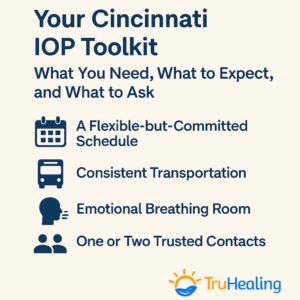Sometimes, the silence gets heavy. You’ve been holding it together—at work, with family, online. But beneath the surface, there’s a quiet weight. You’re not sure if this counts as a crisis. You just know you’re tired of feeling disconnected.
If that resonates, an Intensive Outpatient Program (IOP) could be worth exploring. You don’t have to be in freefall to benefit. At TruHealing Cincinnati, we see IOP as a bridge—a space to reconnect with yourself while staying rooted in your everyday life. This guide will walk you through what to bring, what to expect, and the questions worth asking.
What You’ll Need Before Starting an IOP
Starting an IOP doesn’t require a perfect version of you. But preparing can help you feel more grounded in the process. Here’s a checklist to support you:
✅ A Flexible-but-Committed Schedule
IOP typically runs 3–5 days per week for 2–4 hours at a time. Whether you’re working, caregiving, or in school, take a look at what time slots feel most sustainable. Evening or daytime options are often available.
✅ Consistent Transportation
Rides don’t have to be fancy—just dependable. Metro routes, rideshares, or a supportive friend can all work. Some Cincinnati nonprofits even offer transportation help for treatment-related needs.
✅ Emotional Breathing Room
IOP can stir things up. Creating even 15–30 minutes of downtime after a session—whether that’s a walk, journaling, or sitting in your car—can help you process what’s coming up.
✅ One or Two Trusted Contacts
You don’t need a big support system. But having someone who knows you’re in IOP—who can check in or listen when needed—makes a difference. If that’s not available, peer support groups can fill the gap.
What to Expect in a Cincinnati IOP
Understanding how IOP actually works can make it feel less intimidating. Here’s what’s typically included at a place like TruHealing Cincinnati:
➤ Group Therapy That Meets You Where You Are
Group sessions are built around themes: stress, relationships, relapse prevention, trauma resilience. They’re confidential, facilitated by trained clinicians, and designed for real-life relevance—not forced sharing.
➤ Individual Counseling
You’ll meet one-on-one with a therapist to focus on your specific concerns—whether that’s anxiety, numbness, triggers, or just figuring out why you feel stuck.
➤ Skill-Building & Psychoeducation
You’ll learn how to regulate emotions, communicate more clearly, manage cravings or burnout, and shift internal patterns. It’s not school—it’s survival tools that stick.
➤ Space for Integration
The beauty of outpatient care is that it lets you live while you heal. You’ll practice tools in real life and bring those experiences back into session.
Questions to Ask Before Starting IOP
Asking questions isn’t a weakness—it’s a form of self-advocacy. These can help you get clear on whether a program is a good fit:
- “Can I do IOP while working or taking care of kids?”
Ask about session times and program flexibility. - “Is this program focused on mental health, substance use, or both?”
TruHealing Cincinnati offers integrated care—but not all IOPs do. - “Do I need a diagnosis before starting?”
Not necessarily. You’ll be assessed during intake, but uncertainty is okay. - “What support exists between sessions?”
Some programs include check-ins, crisis planning, or access to alumni networks. - “What happens if I need to pause or miss a day?”
Life happens. Ask how the program handles real-world interruptions.
Local Resources to Support Your Journey
You’re not alone in this—even if it feels that way. Here are Cincinnati-area supports that can make IOP more accessible:
🚌 Cincinnati Metro Transit
Offers discounted passes and route planning. Call 513-621-4455 or visit go-metro.com.
🏢 Community Action Agency Cincinnati
Assists with housing, job readiness, and basic needs. Learn more at cincy-caa.org.
📞 Peer Warm Lines
For non-crisis support from someone who’s been there. Ohio’s statewide peer support line: 1-833-PEER-OSU.
📚 Libraries & Community Centers
Quiet places for decompression or journaling post-session.
Healing doesn’t just happen in therapy—it happens in the in-between moments, too.
The Emotional Side: What If I’m Still Numb?
This might be the hardest part to say out loud: what if you want help, but you don’t feel much of anything?
That’s not weird. That’s real. Emotional numbness is often a protective response to long-term overwhelm. IOP isn’t just about feelings—it’s about learning how to safely feel again. And that’s not a quick fix. It’s a gentle process of thawing.
“I didn’t cry the first three weeks. I didn’t talk much either. But I came back. Because something in me wanted to.”
– Former IOP Client, Cincinnati
FAQ: Intensive Outpatient Program in Cincinnati
How do I know if IOP is right for me?
If you’re functioning externally but feeling unstable, flat, anxious, or emotionally overloaded inside, IOP could be a fit. It’s ideal for people who don’t need 24/7 care but do need structured support.
What’s the difference between IOP and inpatient rehab?
Inpatient means you live at the facility. IOP allows you to live at home, work, and manage daily life while attending therapy several times a week.
Can I attend IOP for mental health without substance use?
Yes. TruHealing Cincinnati treats both mental health and addiction. Many clients come in for depression, anxiety, or trauma without active substance use.
Will I lose my job if I attend IOP?
IOP sessions can often be scheduled around work. Additionally, you may be protected under FMLA (Family and Medical Leave Act). Ask your HR department or counselor for more information.
What if I’ve done treatment before and it didn’t help?
That doesn’t mean IOP won’t help now. Many people return to care after time away. Every attempt counts—and every setting feels different.
Ready to Take the Next Step?
You don’t have to keep managing all this silently. If you’re in the Cincinnati area and wondering whether IOP could help you feel more human again, we’re here to talk—no pressure, no assumptions.
📞 Call TruHealing Cincinnati at (513)643-9117 or learn more about our Intensive Outpatient Program here.
Let’s figure it out together. There’s more available to you than just getting by.


